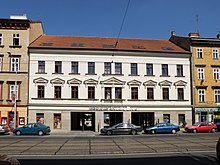Brno City Theater
The Brno City Theater ( Městské divadlo Brno in Czech ) is a repertory theater in Brno , which mainly specializes in plays and musicals . The theater building is located on Lidická Street ( Lidice Street) in the Brno-střed district . It has two stages, one for plays (capacity 365 spectators) and the other for musical performances (680 spectators). In 2011 the theater had the following management: Stanislav Moša as theater director and art director for drama, Petr Gazdík as art director for musicals and Igor Ondříček as art director for singspiel.
A wide variety of dramatic and musical works of art are performed in the Brno City Theater, including new works, often written directly for the Brno Theater. The theater also has its own orchestra.
history
The city theater was established as a German city theater in the 19th century, while only a smaller theater - the theater on Veveří Street - existed as a Czech theater . When Austria-Hungary collapsed after the First World War , these two theater companies swapped roles and the Czech theater moved to the city theater, although the German theater was initially also allowed to play in the city theater on two days, on which mainly opera performances with large stage requirements took place. However, the regular main building of the German theater was the Reduta Theater , which was converted into a theater. The theater was founded as Svobodné divadlo (Free Theater) in the summer of 1945 thanks to the people around director Milan Pásek , with the support of Professor Jiří Kroha . It mainly housed young artists who had longed for a theater (next to the Mahen Theater ) where works by contemporary authors could be played. The theater was renamed several times: Městské a oblastní divadlo (1949), Krajské oblastní divadlo (1950) and Divadlo bratří Mrštíků (Brothers Mrštík Theater) (1954). In 1988 the theater was combined with the satirical theater Večerní Brno and the puppet theater Loutkové divadlo Radost (the theaters had a common director, but were otherwise separate).
After the Velvet Revolution in 1990, Jan Kolegar was elected director. Jan Moša , previous producer, playwright, art director for drama since 1990 and director of the theater since 1992, was responsible for the reconstruction of the unsuitable rooms of the former cinema on Lidická street where the theater is now. The Brno City Theater has had its current name since 1996.
In the 1990s, the theater mostly specialized in musical production. The graduates of JAMU often took part.
Great actors
Some of the actors in the Brno Theater won Thalia and Alfréd Radok awards . Since 2000 the theater has had its own "Walk of Fame" with handprints of its most important actor.
The most important actors of the past include a. Vilma Nováčková , Otakar Dadák , Josef Štefl , Dagmar Pištorová , Jiřina Prokšová , Jana Hliňáková , Stanislav Zindulka , Jaroslav Kuneš and Erik Pardus , some of today's actors are Alena Antalová , Dušan Vitázek , Petr Gazdík , Petr Štěpán , Martin Havelka , Hana Holišová , Pavla Vitázková , Lukáš Hejlík and Zdena Herfortová .
Individual evidence
- ↑ Technické informace (činoherní scéna) (Czech)
- ↑ Technické informace (hudební scéna) (Czech)
- ↑ "Clearly democratically oriented" - The German Theater in Brno 1918 - 1938 on Radio Prague from December 22, 2012, accessed on January 3, 2013
- ↑ Zdenek Srna: Půlstoletí městského divadla v Brně: svědectví Divaka, recenzenta, kritika i o Historika zivote jedné divadelní scény . Brno 1996, p. 302 .
- ↑ Lucie Urválková: Fenomén Městského divadla Brno v brněnské kultuře ( Czech ) In: Magisterská diplomová práce na Filozofické fakultě Masarykovy univerzity . Pp. 67-68. Retrieved May 30, 2011.
- ↑ Městské divadlo Brno a jeho CHODNÍK SLÁVY ( Czech ) Retrieved March 6, 2011.
Web links
Coordinates: 49 ° 12 ′ 4.9 ″ N , 16 ° 36 ′ 29.3 ″ E



